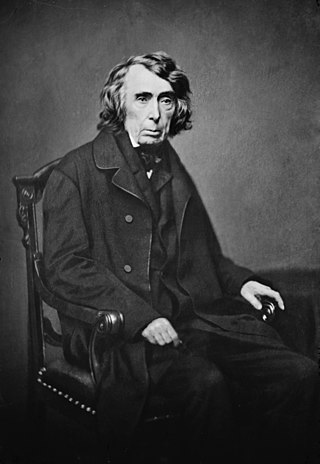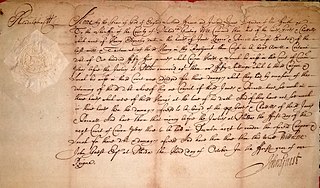Related Research Articles

Contra dance is a form of folk dancing made up of long lines of couples. It has mixed origins from English country dance, Scottish country dance, and French dance styles in the 17th century. Sometimes described as New England folk dance or Appalachian folk dance, contra dances can be found around the world, but are most common in the United States, Canada, and other Anglophone countries.

In court proceedings, a defendant is a person or object who is the party either accused of committing a crime in criminal prosecution or against whom some type of civil relief is being sought in a civil case.
Habeas corpus is a recourse in law through which a person can report an unlawful detention or imprisonment to a court and request that the court order the custodian of the person, usually a prison official, to bring the prisoner to court, to determine whether the detention is lawful.

The Iran–Contra affair, often referred to as the Iran–Contra scandal, or simply Iran–Contra, was a political scandal in the United States that occurred during the second term of the Reagan administration. Between 1981 and 1986, senior administration officials secretly facilitated the sale of arms to Iran, which was the subject of an arms embargo. The administration hoped to use the proceeds of the arms sale to fund the Contras, a right-wing rebel group, in Nicaragua. Under the Boland Amendment, further funding of the Contras by government appropriations had been prohibited by Congress, but the loophole was to use non-appropriated funds.
Mandamus is a judicial remedy in the form of an order from a court to any government, subordinate court, corporation, or public authority, to do some specific act which that body is obliged under law to do, and which is in the nature of public duty, and in certain cases one of a statutory duty. It cannot be issued to compel an authority to do something against statutory provision. For example, it cannot be used to force a lower court to take a specific action on applications that have been made, but if the court refuses to rule one way or the other then a mandamus can be used to order the court to rule on the applications.

Ex parte Merryman, 17 F. Cas. 144 (No. 9487), was a controversial U.S. federal court case that arose out of the American Civil War. It was a test of the authority of the President to suspend "the privilege of the writ of habeas corpus" under the Constitution's Suspension Clause, when Congress was in recess and therefore unavailable to do so itself. More generally, the case raised questions about the ability of the executive branch to decline to enforce judicial decisions when the executive believes them to be erroneous and harmful to its own legal powers.
In law, certiorari is a court process to seek judicial review of a decision of a lower court or government agency. Certiorari comes from the name of an English prerogative writ, issued by a superior court to direct that the record of the lower court be sent to the superior court for review. The term is Latin for "to be made more certain", and comes from the opening line of such writs, which traditionally began with the Latin words "Certiorari volumus...".

In common law, a writ is a formal written order issued by a body with administrative or judicial jurisdiction; in modern usage, this body is generally a court. Warrants, prerogative writs, subpoenas, and certiorari are common types of writs, but many forms exist and have existed.
Ship money was a tax of medieval origin levied intermittently in the Kingdom of England until the middle of the 17th century. Assessed typically on the inhabitants of coastal areas of England, it was one of several taxes that English monarchs could levy by prerogative without the approval of Parliament. The attempt of King Charles I from 1634 onwards to levy ship money during peacetime and extend it to the inland counties of England without parliamentary approval provoked fierce resistance, and was one of the grievances of the English propertied class in the lead-up to the English Civil War.
A writ of assistance is a written order issued by a court instructing a law enforcement official, such as a sheriff or a tax collector, to perform a certain task. Historically, several types of writs have been called "writs of assistance". Most often, a writ of assistance is "used to enforce an order for the possession of lands". When used to evict someone from real property, such a writ is also called a writ of restitution or a writ of possession. In the area of customs, writs of assistance date from Colonial times. They were issued by the Court of Exchequer to help customs officials search for smuggled goods. These writs were called "writs of assistance" because they called upon sheriffs, other officials, and loyal subjects to "assist" the customs official in carrying out his duties.
The hereditary peers form part of the peerage in the United Kingdom. As of August 2023, there are 805 hereditary peers: 30 dukes, 34 marquesses, 189 earls, 110 viscounts, and 442 barons.
In property law, a concurrent estate or co-tenancy is any of various ways in which property is owned by more than one person at a time. If more than one person owns the same property, they are commonly referred to as co-owners. Legal terminology for co-owners of real estate is either co-tenants or joint tenants, with the latter phrase signifying a right of survivorship. Most common law jurisdictions recognize tenancies in common and joint tenancies.
Where two or more persons are liable in respect of the same liability, in most common law legal systems they may either be:
In English law, contra format collations was a writ to recover donations in a situation where a man had given perpetual alms to a religious house, hospital, school, or the like, and the governor or managers had alienated the lands, contrary to the intention of the donor.
In English law, contra formam feoffamenti was a writ for a tenant who was infeoffed by the lord's charter to make certain suit and service to his court, and was afterwards distrained for more than was contained therein.
Rogers v. Okin was a landmark case in which the United States Court of Appeals for the First Circuit considered whether a person diagnosed with mental illness committed to a state psychiatric facility and assumed to be competent, has the right to make treatment decisions in non-emergency conditions.

Harle Syke is a small village within the parish of Briercliffe, situated three miles north of Burnley, Lancashire, England. It was the home to eleven weaving firms, working out of seven mills. Queen Street Mill closed in 1982, and was converted to a textile museum, preserving it as a working mill. It is the world's last 19th-century steam powered weaving mill.
Secundum formam statuti is a legal term which means: "according to the form of the statute" 1.
R v Journeymen-Taylors of Cambridge (1721) 88 ER 9 is a labour law case, concerning the historical attitude of the common law to trade unions. It held that strike action amounted to an unlawful and criminal conspiracy. This attitude prevailed through the 19th century, until trade unions were made lawful by Parliament in the Trade Union Act 1871 and the Conspiracy, and Protection of Property Act 1875. The Trade Disputes Act 1906 confirmed unions' legality at common law once more, and now the position is reflected in international law, particularly the ILO Convention No 87 and 98.
References
 This article incorporates text from a publication now in the public domain : Chambers, Ephraim, ed. (1728). Cyclopædia, or an Universal Dictionary of Arts and Sciences (1st ed.). James and John Knapton, et al.
This article incorporates text from a publication now in the public domain : Chambers, Ephraim, ed. (1728). Cyclopædia, or an Universal Dictionary of Arts and Sciences (1st ed.). James and John Knapton, et al.{{cite encyclopedia}}: Missing or empty|title=(help)